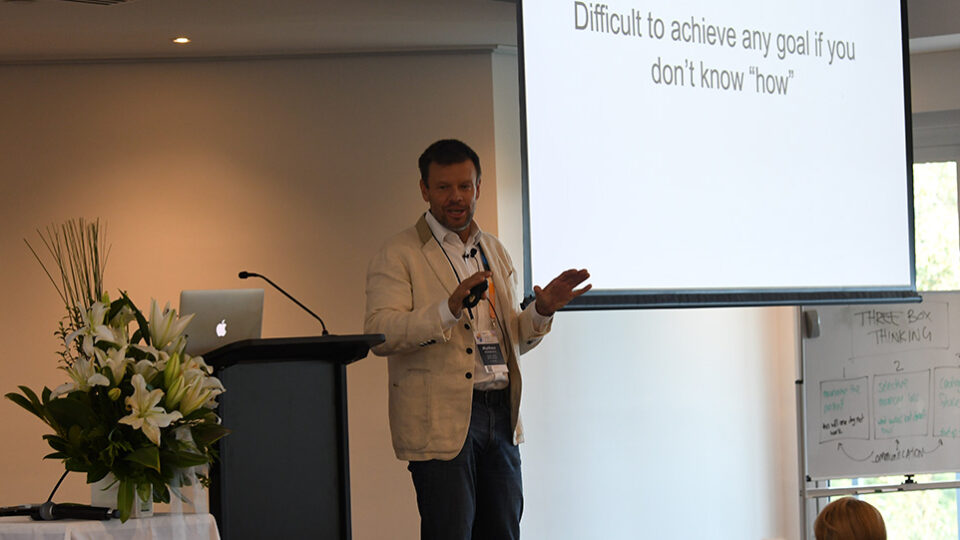
The Science of Success
This article is a summary of the Presentation, titled “The Science of Success”, delivered by Matthew Michalewicz (Speaker, Author, Entrepreneur and CEO, Complexica), at the recent SA/NT Summit. The summary has been provided by communikate et al, partner of the 2023 Educate Plus SA/NT Summit
‘Plan A’ for 16-year-old Matthew Michalewicz was to become the next Arnold Schwarzenegger.
But, after reading Arnie’s 600-plus page Encyclopedia of Modern Bodybuilding, Matthew realised that the book neglected to mention the extra two percent you needed to become an elite bodybuilder – unbelievable genetics and a pharmacologist to support you every step of the way.
It was that realisation that led the highly acclaimed speaker, author and entrepreneur to later research his ‘fact-based’ formula for achieving success in life and business.
At this year’s Educate Plus SA/NT Chapter Summit, Matthew Michalewicz outlined five “simple things that if you do in your life, your chances of succeeding are going to be much, much greater”.
Here is Matthew’s proven path to personal and professional success:
- Create clarity through precise goals
“More than 80 years of research proves that people in organisations with goals outperform the organisations without,” Matthew said, because they had “focus and context”.
However, Matthew says goals must be precise and “in the language of mathematics – that’s minutes, hours, volume, length, percentage etcetera.
A goal shouldn’t be to grow quickly because that’s not measurable. A goal should be to increase your school’s fundraising by 10 percent in the next 12 months.
These precise goals give clarity, and people with clear goals make better decisions and ask better questions.
- Align your goals to your desire
“Desire equals effort” and the more aligned our goals are with our true desires, Matthew says, the more effort we’ll put into achieving them.
Often our goals don’t reflect what we really want to achieve and they need to be re-framed, and if we’re constantly telling ourselves we can’t do something, it’s more likely because we don’t want to do it, than that we can’t actually achieve it.
Examples that Matthew gave included whether a personal goal should be to lose more weight, versus wanting to have more energy, or whether you want to spend more time with family, versus wanting to be a better role model.
- Change your belief by changing your environment
What we believe is more important that what is real, Matthew argues, because we act in a manner that is consistent with our beliefs.
Belief is a better indicator of performance than actual capability, Matthew says, pointing to school students as an example. If they don’t believe they are good at a subject, then they’ll get bad grades, even if they’re more than capable of doing it.
Nothing about our beliefs is genetic and is entirely dependent on those around us. The greatest influences on us, Matthew says, are the five people we spend the most amount of time with besides our families. That’s why we must surround ourselves with friends and mentors who believe in us and support us to achieve our personal and professional goals.
- Invest in knowledge
Matthew says he often hears people say that education is too expensive, and it’s stopping them from being successful, however “the most expensive thing you’re ever going to encounter in your life is ignorance”.
“Ignorance is the difference between where you could have been and where you are, but you lacked the knowledge to close that gap.”
If you can only invest in one thing, invest in yourself.
- Take daily action towards your goals
When goals are so great, they demotivate us to achieve them.
However, according to Matthew, “research has shown that if you can take your goal and break it down into steps or label milestones, they become more achievable and people are much more likely to follow through on the action”.
Coming back to the weight loss example, Matthew said if you wanted to lose 40 kilograms, that’s the big goal. That’s the goal that seems unachievable and makes you lose motivation.
Instead, break it down – the first goal might be to make an appointment with a nutritionist, the second might be to have a personal trainer work with you 2 – 3 times per week, and the third step might be joining a support group of other people working to lose weight.

